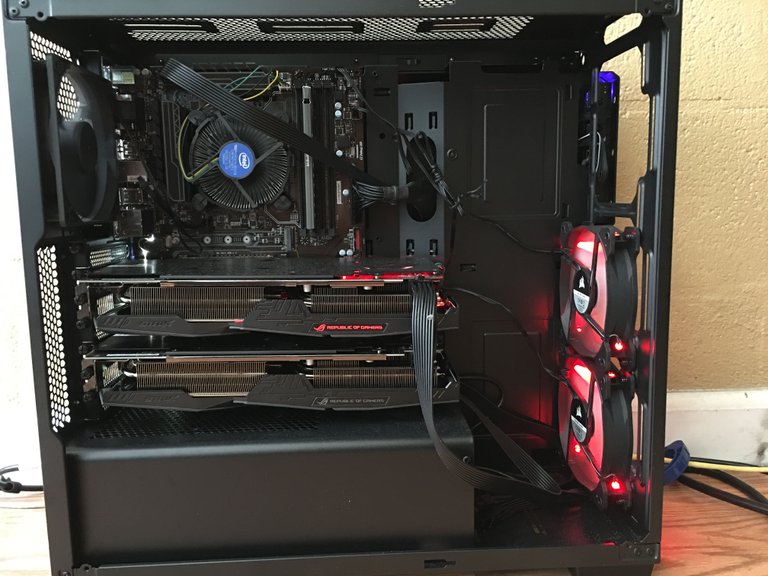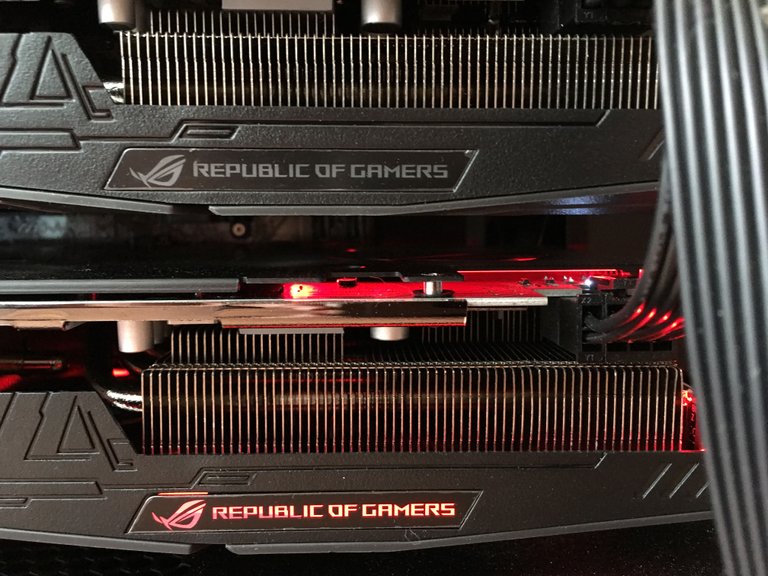I got into crypto back in August of 2017 (pretty late) and managed to ride some early gains into November. I thought it would be fun to try and trade crypto, but here in Hawaii it was a little challenging. Coinbase exited from Hawaii after some requirements from the state made it difficult to do business. Not sure if that was a blesssing or a curse based on the recent problems with coinbase.
That left a few exchanges that weren't the fastest when it came to execution. And funding these accounts via wire transfer became expensive because my local bank charged a minimum of $50 per wire. Gotta love the banks.
So I quickly settled into being a boring hodl'er, dollar cost averaging when I could. But I needed that dopamine high that came from constantly looking at prices.
Out of that necessity I ended up getting into mining. I paid attention to what guys like SonOfaTech (http://bit.ly/2cIgdpy) and Voskcoin (http://bit.ly/2qs5YQy) were doing, watched a couple of videos from the guys over at BitsBeTrippin (http://bit.ly/2CPWZv7) , and started buying parts.
I’m writing this part for you new people out there who don’t have the aptitude for trading crypto, but still want to keep diving into the technical side of crypto while potentially making some money.
I decided to build a 2 GPU rig, using AMD GPUs. I have no idea why I chose AMD, other than at that time the RX580s were only $350 (Nov of 2017) and everything else was $450-$500.
Here’s my parts list:
2 x ASUS ROG-STRIX-RX580 AMD Graphics Card ($344.00)
1 x MSI Pro Series Intel Z270 DDR4 USB 3 CrossFire ATX Motherboard (Z270-A PRO) ($99.00)
1 x Corsair Carbide Series 270R - Mid-Tower ATX Case, Solid Side Panel Cases CC-9011106-WW ($55)
1 x Intel Celeron G3920 Dual-core (2 Core) 2.90 GHz Processor - Socket H4 LGA-1151Retail Pack ($50)
1 x Kingston HyperX FURY Black 4GB 2133MHz DDR4 Non-ECC CL14 DIMM Desktop Memory (HX421C14FB/4) ($58)
1 x EVGA 750 GQ, 80+ GOLD 750W, Semi Modular, EVGA ECO Mode, 5 Year Warranty, Power Supply 210-GQ-0750-V1 ($85)
Total: $1035.00
I’m not going to include the hard drive because drives are pretty cheap and I had an old 500GB SATA drive sitting on my desk doing nothing.
Putting everything together was pretty straight forward. Once everything was plugged in, and the power switch was flipped, everything that had LEDs turned on.
The real challenge
There were a lot of challenging pieces in this project, but hardware (aside from actually acquiring the stuff) wasn’t one of them.
The real challenge was first getting the video out of the rig so that I could set it up. If I could pass on hint on it would be to make sure that you get everything working BEFORE adding in your GPUs. Don’t try to install windows 10 (or whatever OS you decide to run) with everything installed. Minimize the number of troubleshooting points that you’ll need to look at.
I’ve been a Mac guy for a long time now, and I got used to simple one click installers for Apple OSX. Installing Windows 10 was probably the biggest challenge for me. In fact, it is what took me the longest to get done. If that’s you, pay attention to these 2 simple steps:
- Download Rufus (only works on Windows machines) https://rufus.akeo.ie/.
- You’ll need this to create the USB bootable install drive.
- DON’T USE THE WINDOWS MEDIA CREATOR - I tried this several times and my rig wouldn’t boot from the USB. I spent countless hours tweaking my motherboard boot settings for no reason.
- Download the Windows ISO from Microsoft (I used Windows 10).
When you run Rufus, it will ask you for the drive and the iso image. The one hint I would give here is to make sure that you don’t select “Windows to Go” in the “Format Options” section. You’ll need a minimum 8GB USB drive for this.
I tried about 3 different methods that people had on the internet that made things infinitely harder. Turn off your rig, insert the USB stick, and power it back on. It should start the Windows 10 install process.
For my MSI Z270-A PRO board, I had to install the drivers that enabled the Ethernet port to turn on. Fortunately, I had a wifi dongle that I was able to plug in so that I could temporarily access the web to grab the drivers from MSI. It probably would have been easier to just download the drivers on another computer and put it on a USB stick though.
Before you add in the GPUs, make sure that you have a fully functional computer first. * Start Simple. *
Once you get the OS loaded and your motherboard is happy, go download your drivers for the GPUs. For my rig, I had to grab the AMD drivers. You don’t have to install them yet, but it will save you time later after you slot your GPUs.
Once I had an actual working computer, it was time to slot and power the GPUs. I remember sweating during this part because I was worried either the GPUs might be bad or I might fry them by doing something stupid. Take you time during this part because you don’t want to damage those cards. Those are the workhorses of the rig. Everything else exists to support these guys.
If you have the patience, try working with one GPU at a time. Get the drivers loaded, confirm that you can pull video through the card. I had to make a motherboard setting change so tell it to route the video through the card instead of the on-board graphics card.
At this point, I had a working rig.
Modding for Performance
Modding for mining is a different game that modding for gaming performance. In mining, we’re trying to find the balance of hash power and electrical power consumption. And it’s really a dark art. I got some baseline settings off smarter guys on youtube and forums, and then made my own changes to see if it impacted specific mining algorithms.
What the rig is doing today
It’s been about 2 weeks and I’ve been flipping between different coins, trying different algorithms, learning about mining pools, etc.
This rig isn't a big money maker. At most, it can probably gross about $200 before taking out the cost of electricity. But mining provides a door to certain coins that are a difficult to purchase. If I had access to Coinbase, I could deposit fiat, change to bitcoin, and then buy the altcoin. With the mining rig, I grab the miner, find a pool I like, and start mining. Some pools will even exchange the coin you are mining for another coin (like bitcoin, or litecoin, etc) for a fee. But there is nothing like seeing those initial coins appear in your wallet when you first turn up your mining rig.
There is so much more to crypto than the price. Candidly, I feel bad for the people who only interface with Crypto on the basis of price. This is a paradigm shifting technology and price is such a small piece. Once you get your rig mining coins, and you see the results in your wallet, it’s a lot more satisfying than wiring cash to an exchange and trading.
Good luck and happy mining!


Nice build man, nice and clean
Congratulations @jgarces! You have completed some achievement on Steemit and have been rewarded with new badge(s) :
Click on any badge to view your own Board of Honor on SteemitBoard.
For more information about SteemitBoard, click here
If you no longer want to receive notifications, reply to this comment with the word
STOPCongratulations @jgarces! You have received a personal award!
Click on the badge to view your Board of Honor.
Do not miss the last post from @steemitboard:
Congratulations @jgarces! You received a personal award!
You can view your badges on your Steem Board and compare to others on the Steem Ranking
Vote for @Steemitboard as a witness to get one more award and increased upvotes!